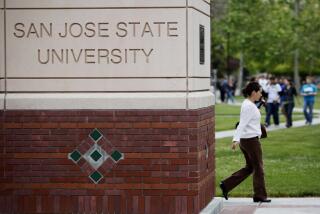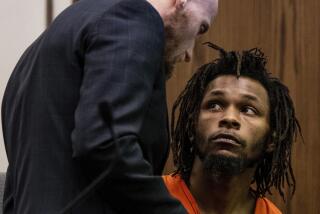Colorado shooting suspect emails released
- Share via
DENVER — In the hours after the Aurora, Colo., movie massacre on July 20, faculty and classmates at suspected gunman James E. Holmes’ university were horrified to realize he had once been among them.
More than 1,500 emails to and from Holmes were made public Wednesday. The emails — released by the University of Colorado-Denver, where he had been a neuroscience doctoral student — were from Holmes’ two university email accounts.
An additional 2,300 internal university staff emails surrounding Holmes’ alleged attack also were released.
In one message, sent the morning of the shooting, a professor said Holmes had a brief romantic relationship with a graduate student in the professor’s department the fall before the shooting.
“She knows, and is pretty freaked out,” wrote Larry Hunter, who is director of the Center for Computational Pharmacology and Computational Bioscience Program, according to the school’s website. The student was in India at the time of the shooting, Hunter wrote.
In a subsequent email he noted that Holmes had worked in the labs of two professors whom he knew and had been rejected for a rotation by another.
Holmes, 24, faces 166 charges in the attack that killed 12 and wounded at least 58 during the premiere of “The Dark Knight Rises” just past midnight in a packed Aurora theater. He is being held without bond.
The defense has objected to the release of any information from the university as a violation of Holmes’ privacy.
Thousands of the emails remain sealed because of patient privilege and a federal law that keeps academic records private. Holmes’ psychiatric condition has been a key issue in the case. His lawyers have said he is mentally ill, and it is widely expected that an insanity defense will be used.
The once promising neuroscience doctoral student entered the University of Colorado-Denver’s program in June 2011 but withdrew a year later after failing a key oral exam. On June 11, 2012 — about six weeks before the shooting — he sought one-time treatment from Dr. Lynne Fenton, a university psychiatrist. At a pretrial hearing, Fenton said she had called campus police after the visit, but what happened that alarmed her has not been disclosed.
State District Judge William Sylvester paved the way last month for the university to release some of the emails, saying it was up to the university to decide what could be made public. The release Wednesday came after requests made months ago from news media including the Los Angeles Times.
Most of the emails to and from Holmes were mundane correspondence sent to all graduate students about campus activities and scheduled department events. It is unclear what has been blocked.
From the earliest days of the case, the prosecution has painted a picture of a brilliant student whose life was unraveling — from his purported statement in March to a classmate that he wanted to kill people to his decision to withdraw.
Just hours after the shooting, Angie Ribera, director of the neuroscience program in which Holmes had been a student, wrote an email to her colleagues with the subject line “Horrible News” wondering whether the person in the news “is the one whom we know.”
In a subsequent message to the graduate school dean, Ribera said she had signed off on Holmes’ withdrawal from the department, though it had not been made official.
“I did sign off on his paperwork and when he left my office he indicated he was off to get the rest of the signatures,” Ribera wrote.
She and other staff hurried to organize a student meeting to discuss the incident.
Hundreds of emails were sent in the aftermath of the shooting. Some advised students to report any information about Holmes to the police. Others revealed immediate reactions to the news by saying simply “Yikes” and “spooky.”
“He could have done this on campus instead of the movies,” wrote a research assistant.
At a preliminary hearing in January, the prosecution is expected to lay out its evidence against Holmes. Last month, a hearing in the case was abruptly delayed when Holmes was taken to the hospital for an undisclosed illness or injury.
Esquivel is a Times staff writer; Deam is a special correspondent.
More to Read
Sign up for Essential California
The most important California stories and recommendations in your inbox every morning.
You may occasionally receive promotional content from the Los Angeles Times.











